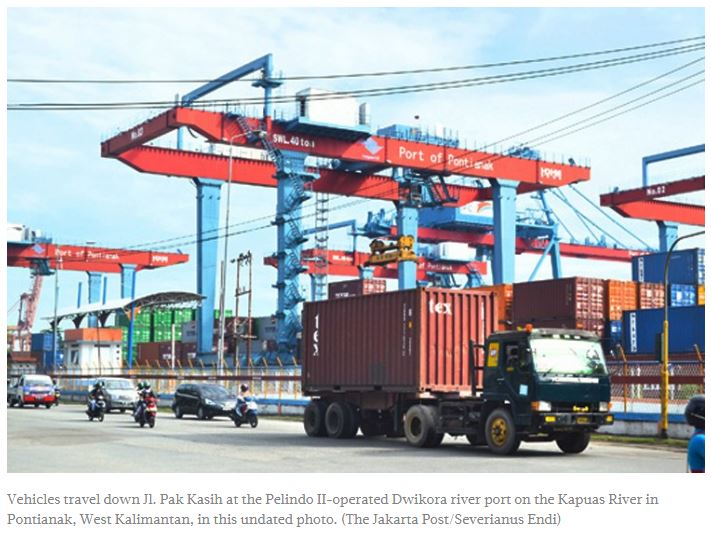Indonesia: Trade data show ‘encouraging sign’ of economic recovery
Indonesia booked its highest exports in six months, driven by rising shipments of agricultural and manufactured goods in September, Statistics Indonesia (BPS) announced Thursday.
In a sign of improving global demand, Indonesia has booked a trade surplus for five consecutive months.
Exports jumped 6.97 percent month-to-month (mtm) in September to US$14.01 billion, the highest recorded since March, before the pandemic took a great toll on the country’s economy. The figure, however, remained 0.5 percent lower than in September last year.
Imports, meanwhile, rose 7.7 percent mtm to $11.57 billion in September due to rising incoming deliveries of raw materials and capital goods, but they are still almost 19 percent lower annually, as household spending remains well below pre-pandemic levels.
As a result, the country booked a $2.44 billion trade surplus in September, bringing the total surplus so far this year to $13.51 billion.
“The September trade data is an encouraging sign of economic recovery, as exports of agricultural and manufactured goods rose, while imports of raw materials for [manufacturing] also picked up,” BPS head Suhariyanto said in a press briefing on Thursday.
Indonesia’s gross domestic product (GDP) shrank 5.32 percent year-on-year (yoy) in the second quarter as all GDP components but net exports contracted. Household spending as well as investment plunged deeper as the COVID-19 pandemic hit purchasing power and demand.
Exports of manufactured goods, which contributed to around 80 percent to total exports, rose 6.61 percent yoy to $11.56 billion in September, driven by higher shipments of steel, palm oil and electrical equipment, among other things.
Exports of agricultural products jumped 16.22 percent annually to $410 million due to rising exports of bird nests, shrimp and vegetables, among other commodities.
Meanwhile, exports of oil and gas products fell 12.44 percent to $700 million amid lower oil prices, while exports of mining products plummeted 35 percent to $1.33 billion because of falling coal prices and lower demand for the commodity.
On the other side, imports of both raw materials and capital goods increased in September to $8.32 billion and $2.13 billion, respectively, but are still down nearly 20 percent annually.
Imports of consumer goods fell 20.38 percent yoy to $1.12 billion.
“Demand from Indonesia’s major export destinations has shown a notable improvement following the global lockdown easing, while the global commodity prices indicate an upward trend,” Bank Mandiri chief economist Andry Asmoro wrote in a research note on Thursday. “These [factors] could support exports going forward.”
However, the potential risk of a second wave of the coronavirus pandemic could hinder the export recovery and global economic activity, he stated, adding to a bleak outlook for imports as the still weak domestic demand would force businesses to postpone investment and production activities.
On that basis, “Indonesia’s imports will keep contracting faster than exports in the last quarter of 2020,” he predicted.
Bank Central Asia (BCA) economist David Sumual said the trade data reflected “the latest sign of recovery” in the country’s manufacturing sector, but the prospect of economic recovery remained uncertain this year.
“The prospect of economic recovery in the fourth quarter will largely depend on the trajectory of the virus, because household spending will remain subdued until a vaccine is available,” he told the Post.
Indonesia’s manufacturing activity has improved significantly in the third quarter compared to the second quarter, according to a survey conducted by Bank Indonesia (BI), as it expects activity to improve further in the fourth quarter.
The rise in Indonesia’s non-oil and gas imports hinted at improvement in domestic demand, JP Morgan Emerging Markets Asia, Economic and Policy Research analyst Nur Raisah Rasid wrote in a note on Thursday.
Business performance in the third quarter had improved significantly compared to the previous quarter, said Indonesian Chamber of Commerce and Industry (Kadin) deputy chairwoman Shinta Kamdani.
“We are confident that business performance will further recover following rising consumption before year-end, and we expect that people’s confidence will improve going forward in line with vaccine availability,” she said on text message on Thursday, adding that demand for Indonesian goods had also picked up in countries that had succeeded in controlling the pandemic.
“On that basis, we are optimistic that the productivity of the national industry will get a boost from people’s rising confidence and rising market demand,” she stated. “But we still need to work hard to maintain people’s confidence in the economy through policy reforms and stimulus.”
Source: https://www.thejakartapost.com/news/2020/10/15/trade-data-show-encouraging-sign-of-economic-recovery.html


 English
English




